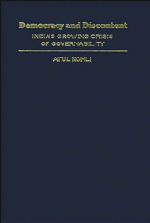Book contents
- Frontmatter
- Contents
- List of tables and figures
- Preface and acknowledgments
- PART I INTRODUCTION
- PART II THE GROWING PROBLEMS OF GOVERNING THE PERIPHERY: POLITICS IN THE DISTRICTS
- PART III ORDER AND BREAKDOWN IN THE STATES
- Introduction: the states
- 8 Breakdown in a “backward” state: Bihar
- 9 Growing turmoil in an “advanced” state: Gujarat
- 10 From breakdown to order: West Bengal
- Conclusion: the states
- PART IV CENTRALIZATION AND POWERLESSNESS AT THE CENTER
- PART V FINAL INFERENCES
- Bibliography
- Index
Introduction: the states
Published online by Cambridge University Press: 05 June 2012
- Frontmatter
- Contents
- List of tables and figures
- Preface and acknowledgments
- PART I INTRODUCTION
- PART II THE GROWING PROBLEMS OF GOVERNING THE PERIPHERY: POLITICS IN THE DISTRICTS
- PART III ORDER AND BREAKDOWN IN THE STATES
- Introduction: the states
- 8 Breakdown in a “backward” state: Bihar
- 9 Growing turmoil in an “advanced” state: Gujarat
- 10 From breakdown to order: West Bengal
- Conclusion: the states
- PART IV CENTRALIZATION AND POWERLESSNESS AT THE CENTER
- PART V FINAL INFERENCES
- Bibliography
- Index
Summary
The decline of the Congress party as an organized political force and increasing challenges to the established patterns of caste, class, and ethnic domination are two general trends in Indian politics that made India's democracy much more turbulent in the 1980s than in the 1950s. This broad picture of political change, however, masks considerable regional diversity within India. Some of that diversity was noticeable in the five districts analyzed earlier. The purpose of Part III of this study is to compare selected Indian states, with the aim of answering the following questions: Why do the patterns of breakdown of order differ? What does comparative analysis of these differences tell us about the causes of breakdown?
Three states will be analyzed. Bihar and Gujarat have both experienced considerable violence and instability over the past two decades. Bihar is one of India's poorest states. Gujarat, by contrast, is one of the country's richest. Comparative analysis of Bihar and Gujarat will enable us not only to distinguish between patterns of breakdown but also to delineate the common factors that lie behind those patterns. Both Bihar and Gujarat will then be juxtaposed against West Bengal, a state that appears to have been relatively free of caste, class, and communal violence, major riots, and government instability during the 1980s. The issue of how and why political order has been restored in West Bengal after a decade of chaos (1967–77) is important in its own right.
Information
- Type
- Chapter
- Information
- Democracy and DiscontentIndia's Growing Crisis of Governability, pp. 203 - 204Publisher: Cambridge University PressPrint publication year: 1991
